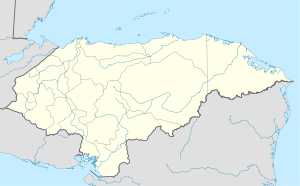San Sebastian, Lempira
This article's tone or style may not reflect the encyclopedic tone used on Wikipedia. (April 2019) |
San Sebastián
Colosuca | |
|---|---|
Municipality | |
 Panoramic View San Sebastián | |
 San Sebastián Location in Honduras | |
| Coordinates: 14°15′N 88°30′W / 14.250°N 88.500°W | |
| Country | Honduras |
| Department | Lempira |
| Municipality since | 7 March 1896 |
| Area | |
| • Total | 227 km2 (88 sq mi) |
| Population (2014) | |
| • Total | 10,857 |
| • Density | 48/km2 (120/sq mi) |
San Sebastian is a municipality in the Honduran department of Lempira.
It is one of the most isolated municipalities in Lempira. It is 13 km from San Manuel Colohete.
History[]
In the 1887 census San Sebastian appears as Colosuca village, of Gracias. It became a municipality on 7 March 1896. The name "Colosuca" means "Beautiful Place"[whose translation?].

Geography[]
This section may be confusing or unclear to readers. (April 2019) |
The municipality capital is up on a big mountain, surrounded by many pine trees and some oak trees. The mountains are very high and steep. In some of these mountains the vegetation changes to bushes and undergrowth. The origin of the rocks and soil all around is volcanic.[citation needed]
Boundaries[]
Its boundaries are:
- North : San Manuel Colohete municipality and Ocotepeque department.
- South : Tomalá and San Andrés municipalities.
- East : La Campa and San Manuel Colohete municipalities.
- West : Guarita, Cololaca and San Marcos de Caiquin municipalities.
- Area: 227 km²
Resources[]
The coffee harvest provides a lot of jobs for the locals and even people from other places because it is the main economical activity of this region. The second most important activity is raising cattle. The commerce of groceries with Gracias is a very profitable activity. The corn and beans crops are mostly for local consumption. In 2007 a sewage system was installed, using water from perforated wells. San Sebastian is connected to the electricity network and has mobile communications coverage. As for the transportation services, only one bus is available and it stays in the municipality capital and travels back from Gracias in the afternoon.
Population[]
This section may be confusing or unclear to readers. (April 2019) |
Indigenous Hondurans are only 60% of the population; the remaining 40% is Mestizo.
- Population:For the year 2001 this municipality had 8,025 people, this figure was the base for an estimate, resulting in 10,857 people for the year of 2015.
- Villages: 7
- Settlements: 108
Tourism[]
Once Colohete is passed the road becomes narrower and steeper and therefore more dangerous. 4-wheel drive vehicles are needed when visiting this municipality. There are two rivers that must be crossed. One can only be crossed during the dry season. The other can be crossed via a bridge. The "congolon" mountain can be seen to the south and some other mountains in Ocotepeque to the north. The old church also gives a good reason to visit, if the traveler enjoys ancient colonial buildings. This municipality is in the "Colosuca" path, this is organised by the national institute of tourism and some Mayor's offices of several municipalities. The object of this is to show the Indian legacy.
- Local Holidays: "San Sebastián" day on 20 January.
External links[]
| Wikimedia Commons has media related to San Sebastián. |

- Municipalities of the Lempira Department

